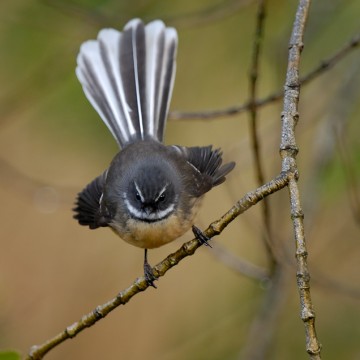Fantail – nature’s answer to the RNZAF’s Red Checkers Aerobatic Team
I encourage you to vote for one of our most energetic and friendly native birds – the fantail (piwakawaka). It is one of our most common and widely distributed native birds on the New Zealand mainland, adapting so well to an environment greatly altered by humans.
The fantail is one of our most recognisable native birds having a long tail which opens into a fan. It has a small head and bill and has two colour forms – pied (yellow-brown with white and black chest bands) and melanistic or black.
They are amazing fliers – they use their broad tails to change direction quickly when hunting for insects. They sometimes hop around upside-down amongst tree ferns and foliage to pick insects from the underside of leaves. Fantails love to eat moths, flies, spiders, wasps and beetles.
Fantails ability in the air to catch insects is essential as each summer they raise three or four families, each with three or four chicks. The chicks are fed about every 10 minutes, which is close to 100 times a day.
There are about 10 sub-species of fantail, three of which live in New Zealand – the North Island fantail, the South Island fantail and the Chatham Islands fantail.
They live almost anywhere there are trees, including coastal scrub, introduced plantations and shrubberies, and can be found in mountain forest in the summer.
Our scientists tell us that fantails are a good indicator species – they tell us where there are good numbers of fantails, the forest is in good health.
Rats, stoats and cats are as great an enemy to fantails as they are to other native birds. Of all the eggs and chicks fantails produce, only a few survive and grow up.
However, the secret to fantails relative success compared to other native birds is their ability to produce lots of young. Some chicks are therefore likely to escape predation and populations can bounce back quickly after a decline. Its broad diet of small insects also makes the fantail resilient to environmental change, because certain insect populations increase in disturbed and deforested habitats.
VOTE FANTAIL NOW……………….VOTE FANTAIL NOW……………………VOTE FANTAIL NOW
Polling closes on November 25th.
Campaign manager – Hon Kate Wilkinson, Minister of Conservation

